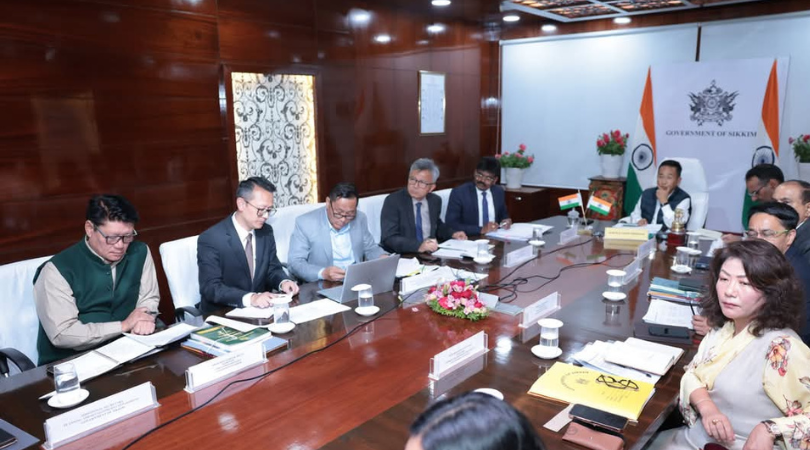Aditya-L1 mission to be launched in first of week September: ISRO chief S Somanath
First Published: 27th August, 2023 9:08 IST
After the launch, it will go to an elliptical orbit and from that it will travel to the L1 point which will almost take 120 days
Shifting the focus to its next space odyssey after successfully placing a lander on the moon‘s uncharted South Pole region, the Indian Space Research Organisation (ISRO) chief S Somanath on Saturday said that the country’s maiden solar mission Aditya-L1 is ready and will be launched in the first week of September.
“Aditya L1 satellite is ready. It has reached Sriharikota and is connected to PSLV. The next aim of ISRO and the country is its launch. The launch will be in the first week of September. The date will be announced within two days,” ISRO chief said.
“After the launch, it will go to an elliptical orbit and from that it will travel to the L1 point which will almost take 120 days,” he added.
Aditya-L1 would be the first space-based Indian observatory to study the Sun.
Aditya-L1, named after the Sun’s core, aims to provide unprecedented insights into the Sun’s behaviour by placing itself in a halo orbit around the Lagrange point 1 (L1) of the Sun-Earth system, approximately 1.5 million kilometres from Earth.
This strategic location will enable Aditya-L1 to continuously observe the Sun without being hindered by eclipses or occultation, allowing scientists to study solar activities and their impact on space weather in real time.
The spacecraft is equipped with seven advanced payloads designed to scrutinize various layers of the Sun, from the photosphere and chromosphere to the outermost layer, the corona.
These payloads employ electromagnetic, particle and magnetic field detectors to capture data crucial for understanding phenomena like coronal heating, coronal mass ejections, solar flares, and more.
One of the most exciting aspects of Aditya-L1’s mission is its ability to directly view the Sun from its unique vantage point at L1.
This will enable four payloads to capture clear observations of the Sun, while the remaining three payloads will conduct in-situ studies of particles and fields at this Lagrange point.
These combined observations promise to unlock the mysteries behind solar dynamics and their effects on the interplanetary medium.
The spacecraft’s data will help identify the sequence of processes that lead to solar eruptive events and contribute to a deeper understanding of space weather drivers.
ISRO Chairman shared an update on June 28 revealing that the organisation is targeting the end of August for Aditya-L1’s launch. (ANI)
Also Read: PM Modi to address 104th episode of Mann Ki Baat today
COMMENTS

TOPMOST STORY NOW

Live Sikkim CM Tamang Charts Development Vision for Viksit Sikkim with Union Minister Scindia
24th April 2025
Live Manipur: JAC Calls 24-Hour Statewide Strike Over Custodial Death of Khoisnam Sanajaoba
24th April 2025
Live BTC Budget 2025-26 Tabled: Focus on Development with Rs. 843 Crore Allocation
24th April 2025
Live “Silence doesn’t bring peace…India must respond”: Pradyot Debbarma on Pahalgam Terror Attack
24th April 2025WE RECOMMEND

“They killed him”: Wife of Pahalgam Terror Victim Recalls Horror
Pahalgam Terror: A pall of gloom descended on Kanpur when the body of Shubham reached his native village in Kanpur on Thursday morning.
24th April 2025
Sachin Tendulkar Turns 52: A look Through the Extraordinary Cricketing Journey of ‘Master Blaster’
Sachin Tendulkar Turns 52: Tendulkar is a name known in households not only in India, but across all major cricketing nations in this world.
24th April 2025
“Hope his soul rests in peace..”: Widow of deceased Navy officer Lt Vinay Narwal at his wreath laying ceremony
"He lived a good life. He made us really proud, and we should keep this pride in every way," said Vinay Narwal's wife.
23rd April 2025
Pahalgam Terror Attack: EaseMyTrip founder announces free rescheduling of flights till April 30
Pahalgam Terror Attack: EaseMyTrip announced that they have extended free rescheduling, cancellation waivers for all bookings until April 30.
23rd April 2025
PM Modi holds urgent briefing in Delhi after terror attack in Kashmir’s Pahalgam
Locals in the Khod village of the Akhoor area of the territory also held a candlelight march protest against the Pahalgam terror attack.
23rd April 2025

